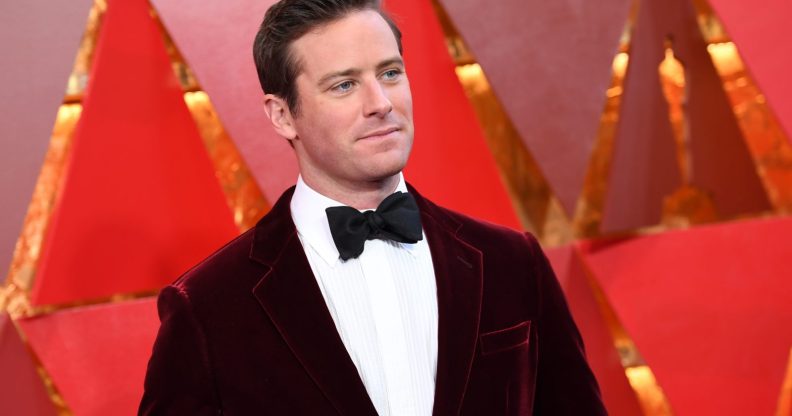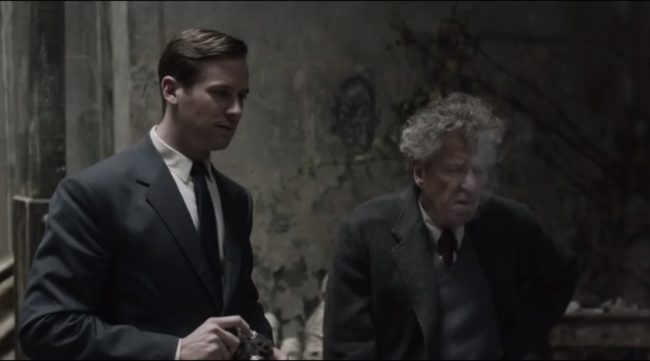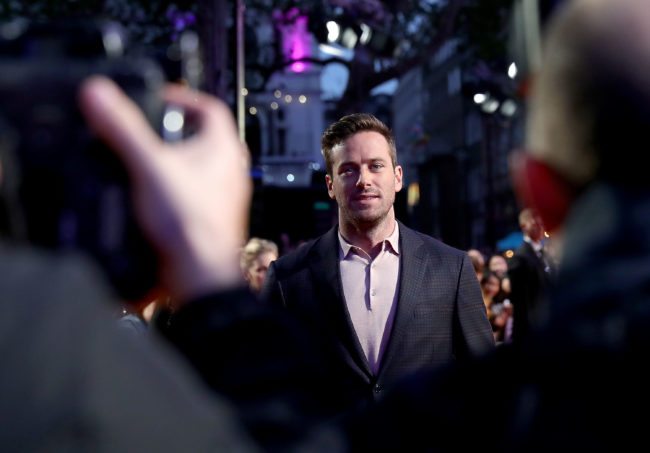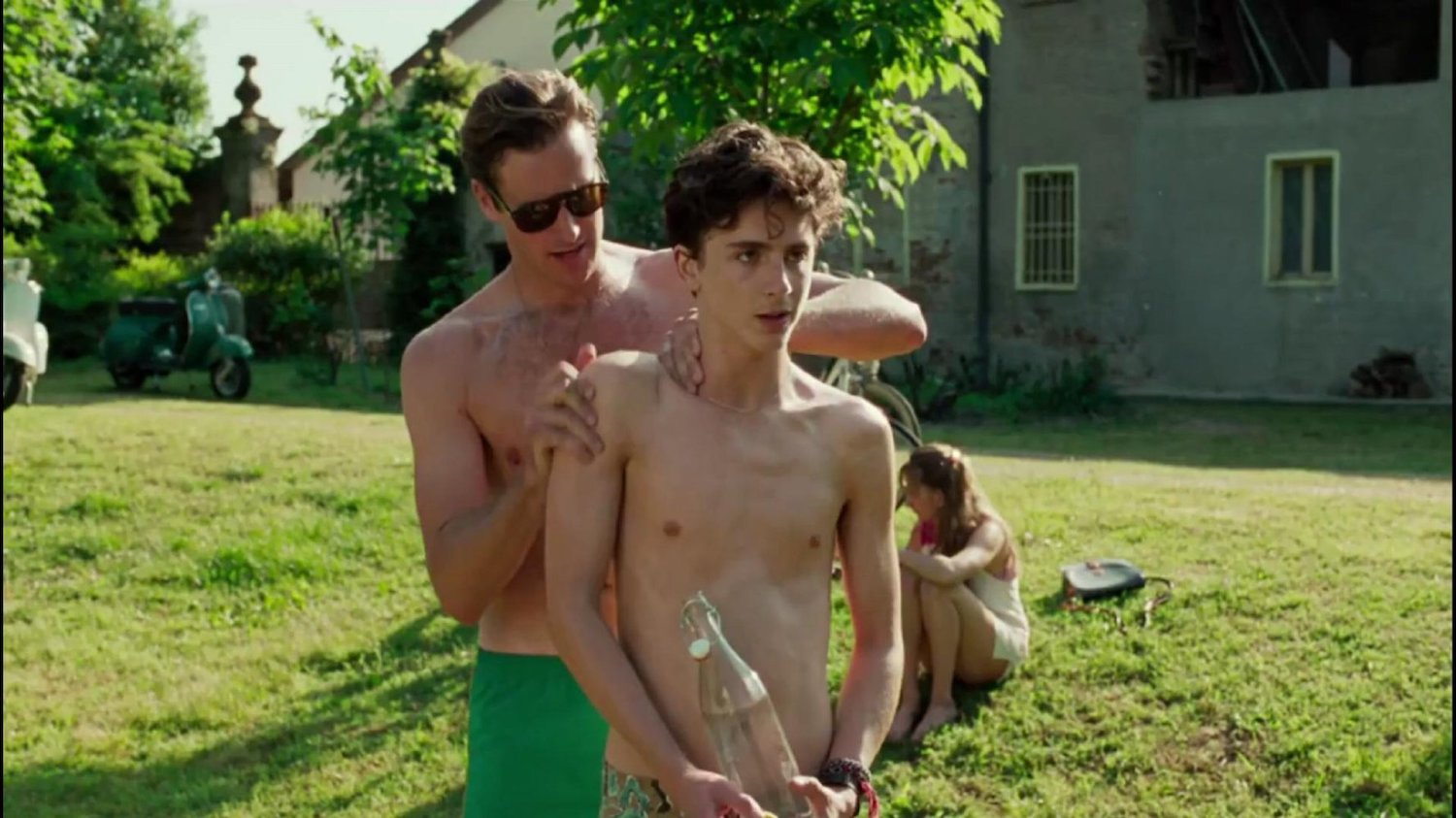Call Me By Your Name’s Armie Hammer is playing a gay man… again

Actor Armie Hammer arrives for the 90th Annual Academy Awards on March 4, 2018, in Hollywood, California. (ANGELA WEISS/AFP/Getty Images)
Call Me By Your Name star Armie Hammer is playing another gay role.
The actor, who is straight in real life, played Oliver in the Oscar-winning gay romance, romancing the young Elio (Timothée Chalamet).
Negotiations on a sequel are already underway… but fans won’t have to wait that long for Hammer to be playing another gay role.
The actor is starring as art lover James Lord in upcoming biopic Final Portrait, which is out in the US this month.

Lord, who penned biographies of Alberto Giacometti and Pablo Picasso, served in the United States Army during World War II and was forced to hide his homosexuality.
He later became a presence on the Paris gay scene, rubbing shoulders with many in the art world.
A synopsis of the film states: “Final Portrait is the story of the touching and offbeat friendship between American writer and art-lover James Lord and Alberto Giacometti, as seen through Lord’s eyes and revealing unique insight into the beauty, frustration, profundity and sometimes the chaos of the artistic process.
“Set in 1964, while on a short trip to Paris, Lord is asked by his friend, Giacometti, to sit for a portrait. The process, promises Giacometti, will take only a few days and so Lord agrees — ultimately wondering ‘how much longer can it go on like this?'”
Hammer, who comes from an extremely wealthy family, has previously hit back at claims that his Hollywood career is a result of his “privilege”.

(Getty)
Earlier this week the actor shared a “fun” throwback snap of a mugshot from a drugs arrest as a 25-year-old.
While thousands of young African-Americans serve lengthy prison sentences under strict mandatory-minimum sentencing laws, Hammer spent one week in jail before being released on a $1,000 bond. All charges were later dropped.
He previously said some of his “conservative” family members may not see Call Me By Your Name.
Speaking to Mr Porter, Hammer said he doesn’t know what his family’s reaction would have been if he had had a gay relationship like the one portrayed in the film.
He said: “I don’t know. I know what I’d hope, but I don’t know.
“I am excited for my dad to see Call Me By Your Name. I think that he would have the capacity to get it and be proud of me for doing this work”.
The actor revealed that his mother may not even see the film, despite the rave reviews and Oscars buzz.
He said: “It’s always awkward to say, ‘Come to this movie where you can see my ass and watch me give a blow job’.
“My mum is more conservative. I don’t know if she’ll see it.”
Hammer has two kids with his wife Elizabeth.
Despite the extremely positive response to the film, some have questioned the casting of two straight men in the gay love story.
Explaining the decision, director Luis Guadagnino said: “This film is about the blossoming of love and desire, no matter where it comes from and toward what. So I couldn’t have ever thought of casting with any sort of gender agenda.
“I think people are so beautiful and complex as creatures that as much as I am fascinated with gender theory — I’ve studied [American gender theorist] Judith Butler for so long — I prefer much more never to investigate or label my performers in any way.
“I only cast the actors and actresses I fall in love with — truly having an emotion for them, an anticipation and enthusiasm when seeing them — and I believe that my emotional confidence in them blends into chemistry. It’s always been like that, and I hope I won’t be wrong in the future.”
Guadagnino also answered questions about why there are no explicit gay sex scenes in the film.

He said: “I wasn’t interested at all. The tone would’ve been very different from what I was looking for.
“I wanted the audience to completely rely on the emotional travel of these people and feel first love. I didn’t want the audience to find any difference or discrimination toward these characters.
“It was important to me to create this powerful universality, because the whole idea of the movie is that the other person makes you beautiful — enlightens you, elevates you.
“The other is often confronted with rejection, fear or a sense of dread, but the welcoming of the other is a fantastic thing to do, particularly in this historical moment.”

